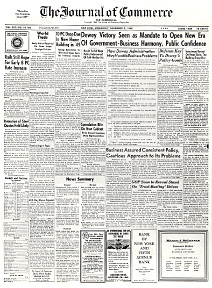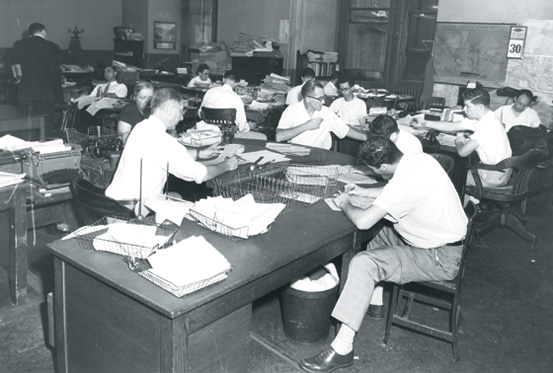 |
|||||||
|
The 1900's-2000's:
11
12
13
14
15
16
17
18
19
20
21
22
< previous
next >
This massive effort was directed by still another Ph.D. economist, Heinz E. Luedicke, who had been the commodities editor before the war. Luedicke wrote analyses of the regulations and their impact on business. He reported on the business reaction to the regulations, which was widely read in the capital. After the war, Joseph Ridder, who had served as a member of the Navy's Price Renegotiation Board, turned control of the JoC over to his two sons, Ben and Eric. Both had served as Marine officers in the Pacific. Ben became publisher and appointed Luedicke as editor to succeed Bogen in 1947. Ben then became publisher of another Ridder paper, the San Jose Mercury-News. Eric, who had been the JoC's business manager, became publisher, a post he held until his retirement in 1985.
The Journal of Commerce concentrated its coverage on shipping, commodities, insurance, foreign trade, foreign exchange, banking, air cargo and domestic transportation. The paper dropped areas of coverage where there was significant competition, such as food, financial market coverage, and stock and bond tables. The paper expanded in the international arena, especially in coverage of Japan and Germany, where it was developing a stream of advertising revenue as those countries rebuilt their industries and shipping. It launched an International Edition in 1949. Meanwhile, a revolution was brewing in the maritime industry. In 1956, Malcom McLean introduced a domestic service that would carry cargo in truck-sized containers on ships.. It signaled a tectonic shift in the way cargo would be shipped globally and triggered events that would change the industry and the paper that covered it. McLean wasn’t the first to put containers on ships. In 1929, Seatrain introduced a railcar-on-ship service between the U.S. and Cuba that was a forerunner of modern containerization. Over the years, other carriers carried small numbers of containers on ships. But because the containers were mixed with assorted breakbulk cargo, their use had little impact on shipping efficiency. Most cargo was still handled piece-by-piece. Except for the introduction of steam winches, little had changed since the days of the Phonecians. About half of ship operating costs were incurred in port. The inefficiency restricted trade. Cargo handling was so expensive and time-consuming that many goods were priced out of the market.
As publisher, Eric Ridder moved the paper into the newly emerging era of electronic publishing. In 1961, the JoC purchased the Commodity News Service and nurtured the fledgling wire service into a period of rapid growth. It was later to become the backbone of Knight-Ridder Financial News, a service designed for Wall Street commodity traders.
The 1900's-2000's: 11 12 13 14 15 16 17 18 19 20 21 22 < previous next > |
||||||
| © Copyright 2005 United Business Media. All rights reserved. | |||||||

